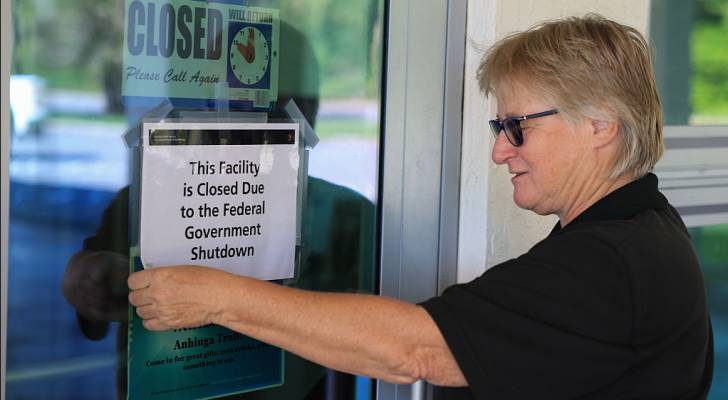
Even before the federal government shut down Oct. 1, many of the 70 million Americans on Social Security wondered what would happen to their benefits.
For 67% of older adults, Social Security is a lifeline that represents more than half their income, according to the Senior Citizens League [1]. Any pause in payments would make getting by difficult.
Must Read
- Thanks to Jeff Bezos, you can now become a landlord for as little as $100 — and no, you don’t have to deal with tenants or fix freezers. Here’s how
- Dave Ramsey warns nearly 50% of Americans are making 1 big Social Security mistake — here’s what it is and 3 simple steps to fix it ASAP
- I’m 49 years old and have nothing saved for retirement — what should I do? Don’t panic. Here are 6 of the easiest ways you can catch up (and fast)
Only time will tell how long it takes for lawmakers to come to an agreement on the spending bill needed to lift the shutdown. The last — and longest — shutdown lasted 35 days from December 2018 to January 2019 during President Trump’s first term [2].
The good news for retirees and those on disability benefits is that the Social Security Administration (SSA) will keep issuing payments. That’s because these benefits are considered mandatory spending, so no further approval is required by Congress [3].
The bad news is that the SSA will halt many other services during the shutdown, affecting existing beneficiaries and those who want to apply for benefits.
How a shutdown affects existing Social Security recipients
So payments will continue as normal. But what about the Social Security Administration’s “administration” side? Not so much.
Approximately 90% of the agency’s staff — 45,000 workers — are to remain on the job, but they’ll be stretched. They were already operating at reduced capacity after the Trump administration culled 7,000 employees [4].
Read more: How much cash do you plan to keep on hand after you retire? Here are 3 of the biggest reasons you’ll need a substantial stash of savings in retirement
That means Americans should expect a delay in administrative services, including getting through to customer support.
And if a mistake happens on the administrative side, the shutdown could spiral into a hassle.
For example, the agency plans to halt earning-record corrections and overpayment processing, which means you might have to wait until after the shutdown is over to get any mistakes corrected.
A prolonged shutdown might delay 2026 Cost of Living Adjustment (COLA) adjustments. That could mean living with a Social Security check that hasn’t kept pace with inflation, making it difficult to make ends meet [5].
If you’re applying for Social Security benefits, expect slower processing and delayed approval. New retirees and prospective retirees might feel the delay acutely.
If facing a delay in the lead-up to retirement, some might choose to delay their departure from the workforce, and those caught in limbo might be forced to drain their savings to stay afloat until their Social Security benefits start to roll in.
How a shutdown affects us all economically
Beyond the direct impact on Social Security, a government shutdown can have a chilling effect on the entire economy.
For example, the 2018 shutdown led to a loss of $3 billion in possible GDP, according to the Congressional Budget Office.
With the economy already facing multiple headwinds, this could add to the slowing job growth. Fewer available jobs can hurt Americans at any stage of life [6].
Unfortunately, what goes on in Washington is largely out of the control of the everyday American.
You can call your representatives to let them know you’d like the shutdown lifted as soon as possible.
Meanwhile, you can continue working to improve your financial situation, with a strong emphasis on building a robust emergency fund to carry you through potentially turbulent times ahead.
Article sources
At Moneywise, we consider it our responsibility to produce accurate and trustworthy content people can rely on to inform their financial decisions. We rely on vetted sources such as government data, financial records and expert interviews and highlight credible third-party reporting when appropriate.
We are committed to transparency and accountability, correcting errors openly and adhering to the best practices of the journalism industry. For more details, see our editorial ethics and guidelines.
[1]. Senior Citizens League “Two-Thirds of Seniors Rely on Social Security for More Than Half Their Income”
[2]. NPR “When will the government reopen? Here’s how long past shutdowns lasted”
[3]. Brittany Pettersen Seventh District of Colorado “2025 Government Shutdown: Common Questions”
[4]. Ohio Capital Journal “Staff cuts have damaged Social Security, former commissioner says”
[5]. AARP “Government shutdown could put 2026 COLA announcement on hold”
[6]. NPR “Cracks in the U.S. economy: Job growth slows 75% from a year ago”
What to read next
- Want an extra $1,300,000 when you retire? Dave Ramsey says this 7-step plan ‘works every single time’ to kill debt, get rich in America — and that ‘anyone’ can do it
- ‘Rich Dad, Poor Dad’ author Robert Kiyosaki says this 1 asset will surge 400% in a year — and he begs investors not to miss its ‘explosion’
- There’s still a 35% chance of a recession hitting the American economy this year — protect your retirement savings with these 5 essential money moves ASAP
- This tiny hot Costco item has skyrocketed 74% in price in under 2 years — but now the retail giant is restricting purchase. Here’s how to buy the coveted asset in bulk
Join 200,000+ readers and get Moneywise’s best stories and exclusive interviews first — clear insights curated and delivered weekly. Subscribe now.
This article provides information only and should not be construed as advice. It is provided without warranty of any kind.